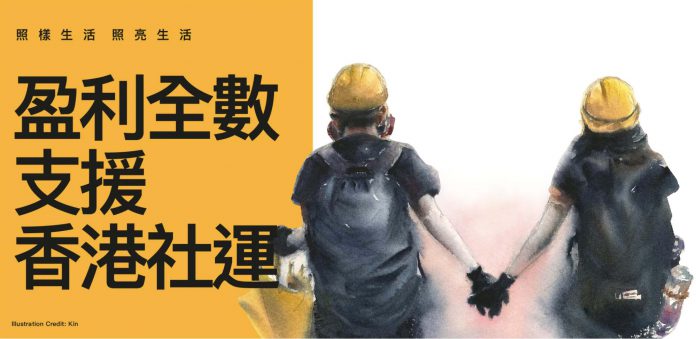Apart from selling daily goods, HKongs provides job opportunities for protesters.
By Reüs Lok
With the ongoing anti-government protests, political stance of a shop or a restaurant becomes one of the major considerations when consumers shop. This gives birth to a new term – “yellow economic circle”. It means that consumers in favour of pro-democracy yellow camp and the anti-Extradition Law Amendment Bill (anti-ELAB) movement only spend money on shops and restaurants that openly support the same political ideal.
HKongs (光時), an online grocery store, is a member of the yellow economic circle. The online shopping platform was launched after the anti-ELAB movement broke out, aiming to provide job opportunities to protesters, especially those who have been arrested or charged.
“We want to provide a job or a stepping stone for those who have been arrested or have become unemployed due to political reasons,” says Sam, a volunteer from HKongs who declines to reveal her full name. “Hiring those who actively participated in the movement is our top priority,” she adds. HKongs now employs 26 protesters or Sau Zuk (手足), a terminology used by protesters referring to each other.
“We want to provide a job or a stepping stone for those who have been arrested or have become unemployed due to political reasons.”
HKongs is very different from other companies. Their team consists of both volunteers and paid employees. All volunteers are recruited through LIHKG, an online forum, and they all have their own full-time job. Volunteers have no salary and need to balance between their full-time job and work at HKongs. There are around 15 volunteers working as company managers and trainers for the online store now.
Hkongs had a tough start when volunteers set up the company. Suppliers refused to provide warehouse support at first. But after building their reputation as a business that helps arrested protesters, suppliers who share their political view actively reach out to them and offer them support.
HKongs is also cooperating with other shops in the yellow economic circle, trying to look for possible ways to share resources and logistics networks. “I’m confident about the development of the yellow economy,” says Sam. She thinks the number of “yellow stores” is increasing, and that helps further develop internal support and communication within the yellow economic circle.
If you want to know more about HKongs and support them, you may make purchases on their website or visit their Facebook page for more details.
Edited by Emilie Lui
Sub-edited by Wayne Chang









































